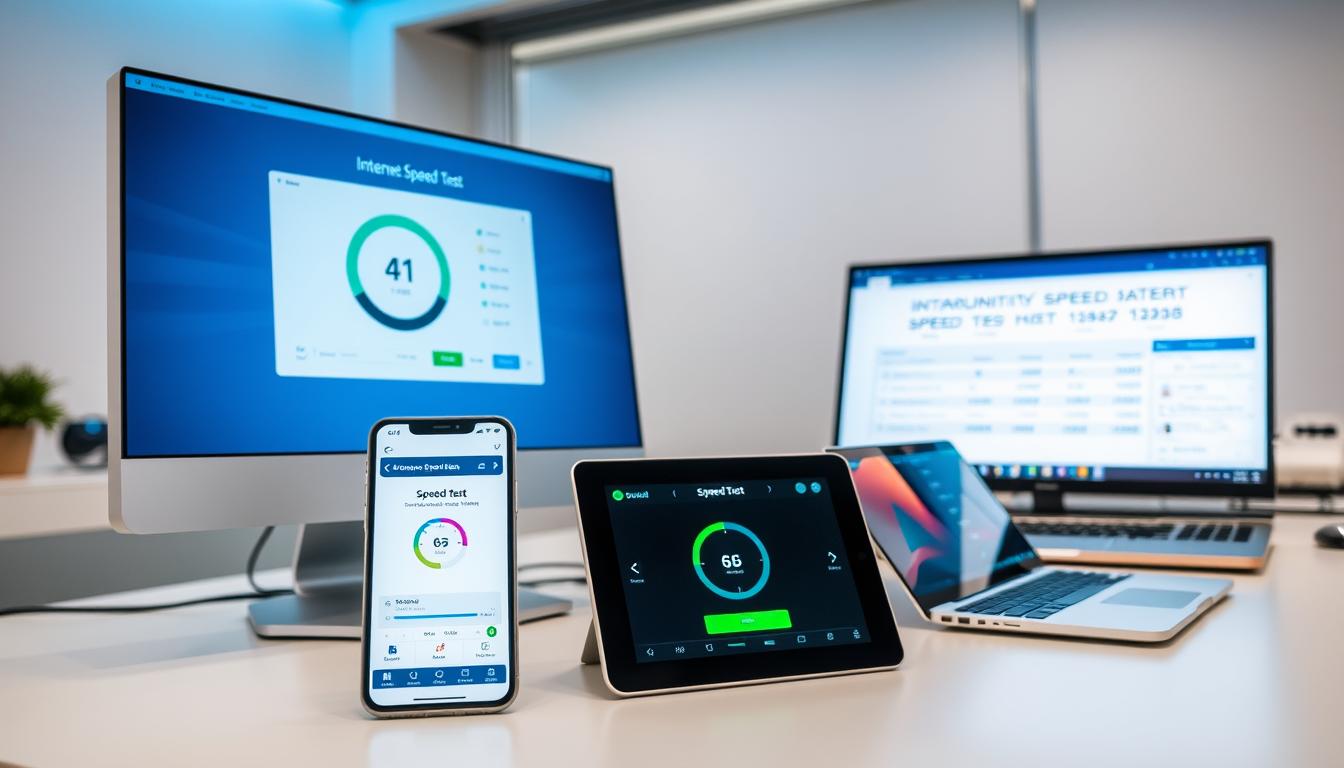In today’s world, a fast broadband connection is key for streaming, gaming, and online work. It’s important to check your internet plans often to make sure they’re right for you.
Many speed test tools are online, giving you quick results. Sites like FAST.com and Speedtest by Ookla show your upload and
accurately.
Knowing your internet speed helps you choose the right online activities and internet plans. This article will show you how to use these tools and understand their results, including charts and stats.
Key Takeaways
- Understand the importance of checking your internet speed regularly.
- Learn about popular free internet speed test tools.
- Discover how to interpret the results from these tools.
- Make informed decisions about your broadband connection.
- Optimize your internet plans based on your speed test results.
Understanding Internet Speed Metrics
To move smoothly in the digital world, knowing internet speed metrics is key. These metrics show how well your internet connection works. They help spot problems and make your online time better.
Download vs. Upload Speeds
Download speed is how fast data comes to your device, important for streaming and browsing. Upload speed is how fast data goes from your device to the internet, key for video calls and sharing files. Having both speeds balanced makes your online time smooth.
Latency and Ping Explained
Latency, or ping, is how long it takes for data to go from your device to a server. Low latency is crucial for fast activities like gaming and video calls. High latency can slow down these activities.
Jitter and Packet Loss
Jitter is when latency changes, making data transfer uneven. Packet loss is when data packets don’t reach their destination, causing poor internet quality. Both can hurt your online experience.
What Speeds Do You Really Need?
The speed you need depends on what you do online. For simple browsing, slower speeds are okay. But for streaming and gaming, you need faster speeds. Knowing what you need helps pick the right internet plan.
| Activity | Recommended Speed |
|---|---|
| Basic Browsing | 1-5 Mbps |
| Streaming HD Video | 5-10 Mbps |
| Online Gaming | 10-50 Mbps |
Why Regular Internet Speed Testing Matters
Testing your internet speed often is crucial for good network performance. It helps make sure you’re getting the speeds your internet service provider (ISP) promised.
Verifying ISP Promised Speeds
Testing your internet speed is mainly to check if your ISP is delivering what you pay for. If your speeds are much lower, it’s time to talk to your ISP or look for a new one.
Identifying Connection Problems
Speed tests can spot connection problems early. A sudden speed drop might mean there’s an issue with your connection that needs fixing.
Optimizing Home Network Performance
Regular speed tests help you optimize your home network for better performance. Knowing your network’s limits helps you decide on upgrades or changes.
Tracking Performance Over Time
Tracking your speed test results over time shows trends and patterns. This info is key for solving ongoing issues or talking to your ISP.
As
“The internet is a vital tool in today’s world, and having a reliable connection is crucial for both work and leisure.”
, regular internet speed testing is key to a connection that meets your needs.
How to Test Internet Speed Properly
Testing your internet speed is more than just clicking a button. It needs a strategic approach. Follow these guidelines to optimize your internet speed testing process.
Preparing Your Device for Accurate Testing
Before running a speed test, close any unnecessary applications and background programs. This includes streaming services, file downloads, and online backups. Doing this minimizes their impact on your test results.
Choosing the Right Testing Time
The time you test your internet speed can affect the results. Test during different times of the day to account for network congestion. Speeds are usually slower during peak hours (evenings) and faster during off-peak hours.
Multiple Tests vs. Single Test
One test can be misleading. Conduct multiple tests over a period to get a comprehensive view. This helps identify any patterns or anomalies in your connection.
Documenting Your Results
Keep a record of your test results, including the date, time, and speeds. Documenting your results lets you track your internet performance over time. This helps you make informed decisions about your service.
By following these steps, you can ensure accurate and reliable internet speed tests. This gives you a clear picture of your broadband’s performance.
How Internet Speed Tests Actually Work
Internet speed tests measure how fast data can be sent and received. They check the maximum speed by downloading and uploading data from servers.
The Technical Process Behind Speed Tests
The process starts with finding the closest server to reduce delay. Then, it downloads and uploads data to find the top speed. This is done using TCP and UDP protocols to mimic real internet use.
Server Selection and Its Impact on Results
Server selection is key for accurate results. A distant server can cause slower speeds. Today’s tools pick the nearest server to avoid this.

Data Measurement Methodologies
Speed test methods differ. Some use many threads to fill the connection, others a single thread for steady results. The method chosen can influence the test’s accuracy and its match to real use.
Test Duration and Accuracy Correlation
Test length affects accuracy. Longer tests give more stable results by smoothing out changes. But, very brief tests might miss the connection’s full potential.
Knowing these details helps users understand their speed test results better. It aids in making smart choices about internet plans.
Top Free Tools to Test Internet Speed
To understand your internet connection’s performance, using top free tools is key. These tools offer various features like detailed stats and graphs. They help you grasp your internet speed.
Speedtest by Ookla
Speedtest by Ookla is a top choice for testing internet speed. It’s known for its accuracy and detailed data. It gives you a clear view of your internet connection.
Features and Accuracy
Speedtest by Ookla shows accurate download and upload speeds and latency. Its wide server network ensures reliable results.
Stats and Graphs Provided
The tool provides detailed stats and graphs. These let you track your internet performance over time. You can see historical data to spot patterns or issues.
Google Speed Test
Google Speed Test is a handy tool for checking your internet speed. It’s right in the search engine results page.
Integration with Search
Just type “internet speed test” in Google to use its built-in tool. It gives you quick results.
Simplicity and Limitations
Google Speed Test is easy to use but lacks some features. It doesn’t offer as much detail as Speedtest by Ookla.
Fast.com by Netflix
Fast.com is a speed test tool by Netflix. It’s great for checking if your internet is good for streaming.
Streaming-Focused Measurements
Fast.com mainly tests download speed. It’s a simple tool to see if your internet is good for streaming.
Advanced Options
Fast.com also offers more detailed metrics. You can see upload speed and latency for deeper data.
Speedof.me
Speedof.me uses HTML5 technology for fast and easy speed tests. It’s known for its user-friendly interface and detailed graphs.
HTML5 Technology
Speedof.me works smoothly with HTML5. It doesn’t need extra plugins or software for testing.
Detailed Performance Graphs
The tool creates detailed graphs of your internet speed over time. These graphs help you see your connection’s performance.
Understanding Speed Test Statistics and Graphs
Speed test data helps you choose the right internet plan. It shows how well your internet works, letting you see trends and fix problems. This way, you can make your network better.
Reading Line Graphs and Bar Charts
Speed test results often use line graphs and bar charts. Line graphs show how speed changes over time. Bar charts compare different speeds, like download and upload. Look for patterns or big changes to spot issues.

Interpreting Performance Over Time
Looking at your internet speed over time can teach you a lot. Find out when speeds are low or change a lot. This could mean your network is busy or there’s a problem with your ISP.
Spotting Patterns and Anomalies
Checking your speed test data often can help you find patterns or one-time problems. For example, slow speeds at busy times might mean your network is full. A single odd reading could be a short-term issue.
Exporting and Sharing Your Data
Many tools let you save and share your speed test data. Saving it is great for tracking changes or comparing different places. Sharing it with your ISP can help prove if your service is bad.
| Metric | Description | Importance |
|---|---|---|
| Download Speed | Measures how quickly data is transferred from the internet to your device. | High download speeds are crucial for streaming and downloading large files. |
| Upload Speed | Measures how quickly data is sent from your device to the internet. | Important for online gaming, video conferencing, and uploading large files. |
| Latency/Ping | Measures the time it takes for data to travel from your device to a server and back. | Lower latency is essential for real-time applications like online gaming and video calls. |
By understanding speed test data, you can learn more about your internet. This knowledge helps you make better choices to improve your connection.
Browser-Based vs. App-Based Speed Tests
To find the most accurate internet speed, it’s important to know the differences between browser-based and app-based tests. Each has its own benefits and drawbacks. This helps decide which one is best for you.
Pros and Cons of Browser Testing
Browser-based speed tests are easy to use because you don’t need to install anything. They’re simple to access and can be run right from your browser. But, their results might be affected by your browser’s cache and extensions.
- Pros:
- Easy to access
- No installation required
- Cons:
- Potential impact from browser cache and extensions
- May not be as accurate as app-based tests
Benefits of Dedicated Speed Test Apps
Dedicated speed test apps are made just for measuring your internet speed. They usually give more precise results. They also offer extra features like looking at your past speeds and detailed stats.
Key benefits include:
- More accurate results
- Additional features like historical data
Which Option Provides More Accurate Results?
App-based speed tests are generally more accurate because they’re made for this purpose. But, the accuracy of both can change based on your device and network conditions.
In summary, while both types have their good points, app-based tests are usually more precise. Think about what you need before choosing between them.
Factors That Can Affect Speed Test Accuracy
Knowing what affects speed test accuracy is key for getting reliable results. Many things can change how your internet speed test turns out. It’s important to think about these factors to get an accurate reading.
Device Limitations
Your device’s abilities greatly impact your speed test results. Older or less powerful devices might struggle with fast data transfers. This can skew your test results.
Wi-Fi vs. Wired Connections
The connection type you use for your speed test matters a lot. Wired connections usually give more accurate results than Wi-Fi. This is because wired connections are less likely to get interrupted.
Network Congestion
When many devices use the same network, it can slow things down. This is called network congestion. It can make your speed test results less accurate if not managed well.
Background Applications
Apps running in the background can use up bandwidth. This can mess with your speed test results. It’s a good idea to shut down any apps you don’t need before testing your speed.
VPN Usage
Using a VPN can also affect your speed test results. VPNs can add extra delay and slow down your internet speed.
| Factor | Impact on Speed Test |
|---|---|
| Device Limitations | Can reduce test accuracy due to processing power constraints |
| Wi-Fi vs. Wired | Wired connections provide more accurate results |
| Network Congestion | Can lead to slower speeds and inaccurate results |
| Background Applications | Consumes bandwidth, affecting test results |
| VPN Usage | Can introduce latency and reduce internet speed |
Mobile Speed Testing Tools and Considerations
Mobile internet use has grown a lot. Testing your mobile speed is now more crucial. Mobile devices use two main connections: cellular and Wi-Fi.
Cellular vs. Wi-Fi Testing
It’s key to know the difference between testing cellular and Wi-Fi. Cellular testing checks your mobile data network’s speed. Wi-Fi testing looks at your wireless internet speed.
Top Mobile Speed Test Apps
Many apps help test your mobile speed. Some top ones are:
- Speedtest by Ookla
- Google Speed Test
- Fast.com by Netflix
Understanding Mobile-Specific Metrics
Mobile speed tests use special metrics. These include signal strength and network type (like 4G, 5G).
| Metric | Description | Importance |
|---|---|---|
| Signal Strength | Measures your cellular signal’s power | High |
| Network Type | Tells if you’re on 4G, 5G, etc. | High |
| Data Speed | Shows how fast data is sent | High |
Data Usage Warnings
Watch your data use when testing mobile speed. This is very important if you’re on a small data plan.
Tracking Mobile Performance Over Time
Testing your mobile speed often helps track changes. It shows patterns and any problems.
Using Speed Test Data to Improve Your Connection
To get the most out of your internet, it’s key to know how to use speed test data. By looking at your internet speed test results, you can spot areas to improve. This helps make your online experience better.
Identifying Bottlenecks
The first step to better internet is finding bottlenecks. Speed test data shows if your ISP is giving you the speeds you pay for. If your speeds are always lower than expected, it might mean a problem with your ISP or home network.
Router Optimization Techniques
Your router is key to your internet. Making your router’s settings better can really boost your speeds. Try keeping your router’s firmware up to date and placing it to avoid interference.
When to Upgrade Your Equipment
Old equipment can slow down your internet. If your router or modem is old, it might be time for a new one. Newer hardware can handle faster speeds.
ISP Plan Considerations
Your ISP plan affects your speeds too. If your speeds don’t meet your needs, think about getting a better plan.
Creating a Performance Improvement Plan
By looking at your speed test data, you can make a plan to improve your internet. This might include better router settings, new equipment, or a different ISP plan.
As
“The key to improving your internet connection lies in understanding your speed test data and taking proactive steps to address any issues.”
By taking these steps, you can greatly improve your online experience.
Conclusion: Making the Most of Free Speed Test Tools
Using free speed test tools is key to knowing your internet speed. They help you see if your Internet Service Provider (ISP) is giving you what you pay for. This is important for your online experience.
Speed tests can spot problems like too much traffic or old hardware. Tools like Speedtest by Ookla, Google Speed Test, and Fast.com by Netflix make it easy to check your speed. They also let you see how your speed changes over time.
Looking at your speed test results can help you improve your home network. You might need to update your gear or tweak your router settings. Faster internet means better streaming, gaming, and work from home.
Free tools give you the power to manage your internet better. This way, you can get the best from your internet plan.



